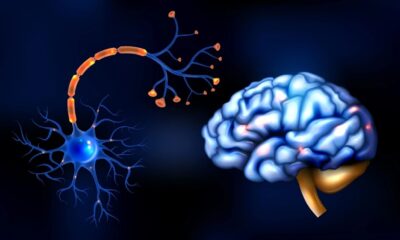Health
Waheed Lawal and Listening First: A Guiding Principle in Psychiatric Practice

Effective psychiatric care starts not with answers, but with questions—and more importantly, with listening. The act of truly hearing a patient can shape the entire clinical experience, from diagnosis to treatment planning. As Waheed Lawal knows, it builds trust, uncovers hidden layers of experience, and builds a collaborative relationship that empowers the patient.
Research continues to affirm the correlation between strong listening practices and improved mental health outcomes. When clinicians approach patients with openness and attention, they create a space where healing conversations can begin. This doesn’t simply benefit the patient—it also equips the clinician with the insight needed to offer more precise, compassionate care.
“Listening First” in Psychiatric Care
“Listening first” refers to the practice of hearing a patient’s concerns before offering judgments, diagnoses, or treatment plans. In psychiatric care, this approach shifts the focus from immediate problem-solving to understanding the person’s lived experience in full.
The roots of this principle go back to early therapeutic models where the patient’s narrative was central to care. Over time, this has become a clinical standard, emphasizing the need to understand not just symptoms, but context, emotion, and meaning behind what is shared. This philosophy aligns with trauma-informed care, where the clinician avoids assumptions and instead prioritizes the patient’s voice.
When patients feel genuinely heard, they are more likely to speak openly about sensitive topics. A psychiatrist who prioritizes listening may notice subtle shifts in tone or pauses that reveal distress or hesitation, leading to deeper understanding and more responsive care.
Listening and Its Role in Accurate Diagnosis
In psychiatric evaluations, listening is more than passive hearing—it is an active process that shapes the accuracy of diagnosis. By allowing patients to speak freely and without interruption, clinicians often uncover essential details that structured questions might miss. These nuanced disclosures may point to comorbid conditions or underlying stressors that are not immediately visible.
A patient describing their sleep disturbances in their own words may reveal underlying anxiety or trauma that wouldn’t surface through a checklist alone. Subtle cues such as repeated phrases or shifts in speech patterns can suggest deeper emotional states, guiding the clinician toward a more nuanced understanding of the issue. These observations can also help distinguish temporary distress from a more chronic condition.
Effective listening not only aids in identifying symptoms but also helps distinguish between overlapping conditions. A misdiagnosis can result when a practitioner relies solely on surface-level data, whereas attentive listening brings clarity to complex concepts.
Techniques Clinicians Utilize
Skilled clinicians train themselves to pick up on more than what is said. Eye contact, body posture, and tone often communicate more than the words themselves. Silence, when used thoughtfully, gives space for reflection, encouraging patients to share more than they might initially intend. These nonverbal cues often carry emotional weight that supports a more complete comprehension.
Distractions, emotional fatigue, and time pressures can all interfere with listening. Mental health professionals must learn to recognize these barriers and implement strategies to stay present. Some do this by mentally resetting between sessions, while others adopt brief mindfulness techniques to clear their attention.
Even seasoned practitioners revisit and refine their listening techniques over time. What works with one patient may not be effective with another, making flexibility and self-awareness essential parts of the process. Regular reflection and supervision help maintain high standards of communication.
Supporting Patient-Centered Care Through Listening
When clinicians prioritize listening, it naturally shifts the dynamic toward collaboration rather than authority. Patients often feel more respected and involved, which can encourage them to take an active role in their treatment.
A patient who feels heard may be more willing to discuss medication concerns, explore lifestyle changes, or engage in therapy more consistently. Listening also helps uncover cultural or personal values that shape how someone views mental health, allowing care to be better tailored to individual needs.
By creating a space where patients don’t feel judged or rushed, clinicians reduce stigma and promote honesty. This is especially important in communities where mental health carries historical mistrust or shame. Listening becomes not just a tool for diagnosis, but a quiet form of advocacy. In many cases, it’s the first act that a patient experiences.
Building Listening Skills in Clinical Training and Practice
Clinical education increasingly emphasizes communication as a core competency. New practitioners often practice listening through simulated patient encounters, where feedback focuses not only on what they say, but also on how well they absorb what is said to them. These exercises help build comfort in navigating emotional disclosures and silences.
In real-world settings, learning doesn’t stop after training. Peer supervision, reflective practice, and patient feedback all contribute to ongoing growth. A psychiatrist might notice their tendency to interrupt during sessions and work consciously to adjust that habit. Even seasoned professionals benefit from revisiting the basics of attentive communication.
Navigating Barriers to a Listening-First Approach
Time constraints are one of the biggest obstacles. With packed schedules and administrative tasks piling up, it can be difficult to give each patient the full attention they deserve. Yet even brief moments of focused listening can make a difference when done with intention. A five-minute pause to genuinely engage can shift the entire tone of a session.
Emotional fatigue is another quiet barrier. When clinicians are overwhelmed or burned out, their capacity to listen deeply tends to shrink. Recognizing when that’s happening—and seeking support—can help maintain effectiveness.
Disclaimer: This is a sponsored piece of content. Time Bulletin journalists or editorial staff were not involved in the production or writing of this content.
-

 Education3 weeks ago
Education3 weeks agoBelfast AI Training Provider Future Business Academy Reaches Milestone of 1,000 Businesses Trained
-

 Business4 weeks ago
Business4 weeks agoAdel En Nouri’s Tips for Writing a Business Plan in 2026 That Actually Works
-

 Tech4 weeks ago
Tech4 weeks agoJonathan Amoia’s Insights on the Intoxication of Artificial Intelligence
-

 Health4 weeks ago
Health4 weeks agoTolga Horoz: How Developing an Interest in How People Solve Problems Shapes Better Thinking and Innovation
-

 Sports2 weeks ago
Sports2 weeks agoUnited Cup 2026: Full Schedule, Fixtures, Format, Key Players, Groups, Teams, Where and How to Watch Live
-

 Cryptocurrency4 weeks ago
Cryptocurrency4 weeks agoWhen Crypto Markets Calm Down: How NB HASH Builds Stable Passive Income Through AI Computing Power
-

 Book2 weeks ago
Book2 weeks agoAuthor, Fighter, Builder: How Alan Santana Uses His Life Story to Empower the Next Generation Through UNPROTECTED
-

 Health3 weeks ago
Health3 weeks agoNew Research and Treatments in Motor Neurone Disease












